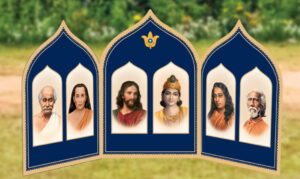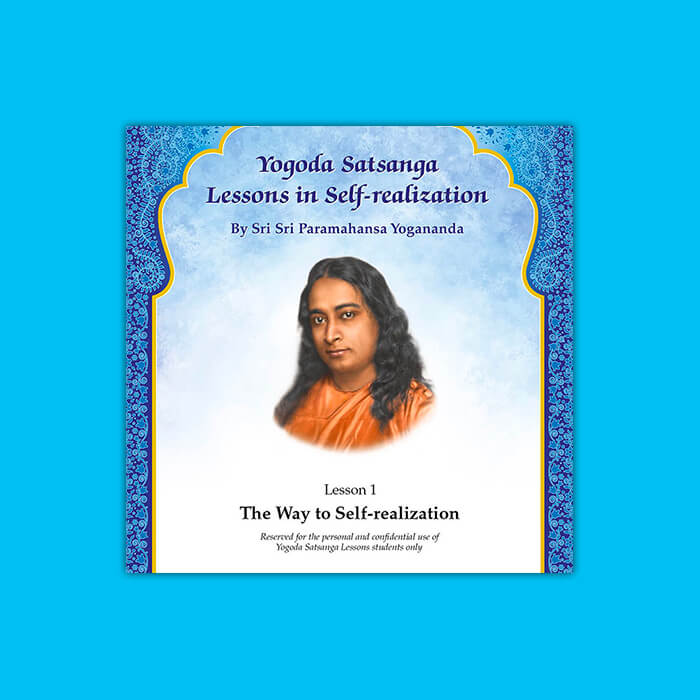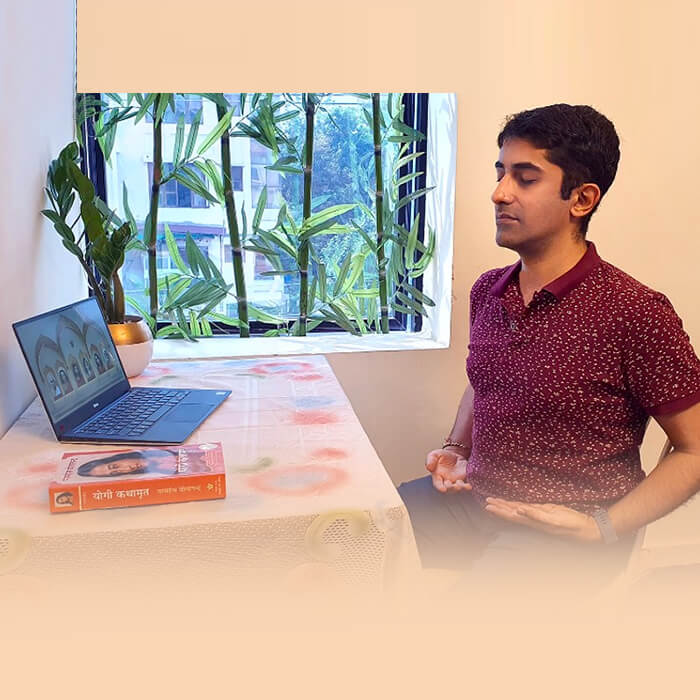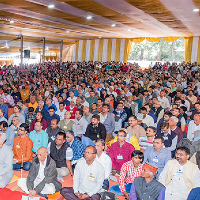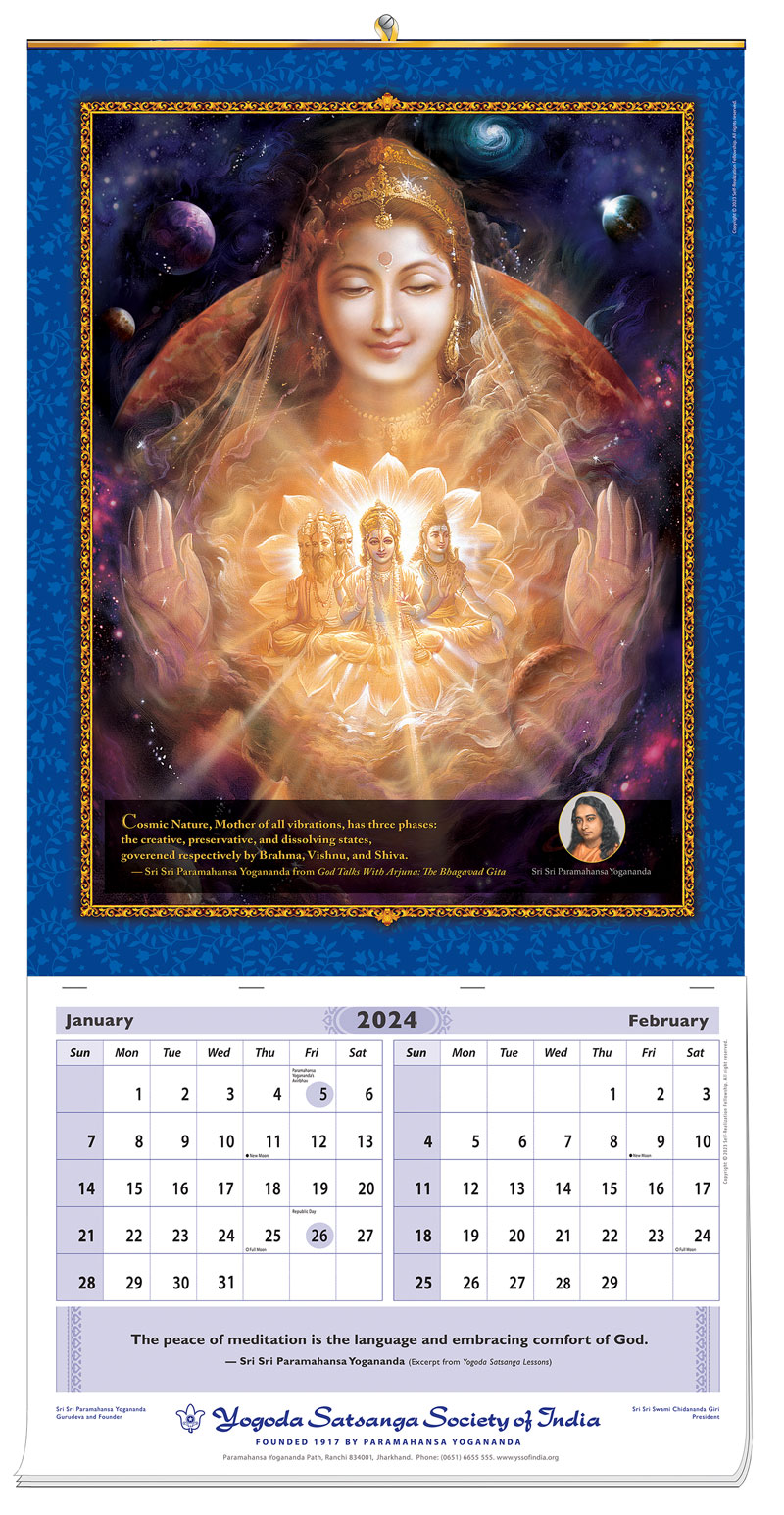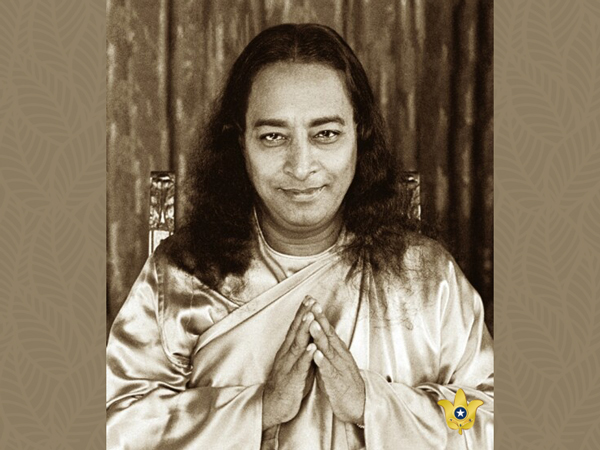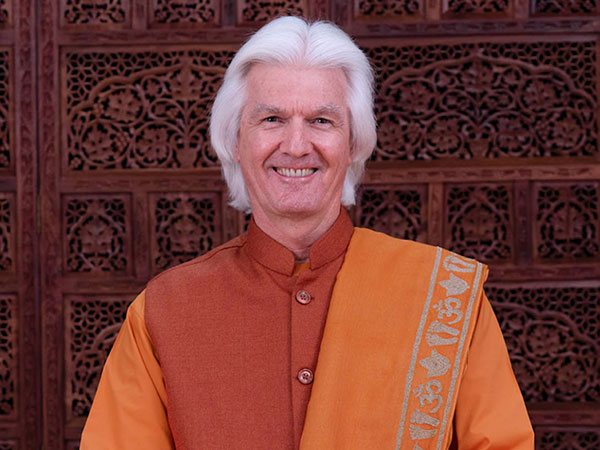Excerpts from “How to Be Happy at Will,” a talk given by Paramahansa Yogananda. The full talk can be found in Man’s Eternal Quest, the first volume of Paramahansaji’s Collected Talks and Essays, published by YSS.
As you watch the faces of human beings, you can usually classify their expressions into four basic types, with corresponding mental states: smiling faces, bespeaking inner and outer happiness; grim faces, denoting sadness; dull, unsmiling faces, revealing inner boredom; and calm faces, reflecting an inner peace.
A desire satisfied produces pleasure. A longing unfulfilled creates sadness. Between the mental crests of happiness and sadness are troughs of boredom. When the high waves of pleasure and pain and the depressions of boredom become neutralized, the state of peace manifests.
Beyond the state of peace there is an ever-new state of bliss, which the individual can find within himself and recognize as the true native state of his soul. This bliss is buried beneath the exciting mental waves of exuberant pleasure and deep depression and the hollows of indifference. When these waves disappear from the mental waters, the placid state of peace is felt. Reflected in the calm waters of peace is the ever-new bliss.
Basis of People’s Reactions
Most people in the world are tossing on the waves of exciting pleasure or pain, and when these are wanting, they are bored. As you watch the faces of others during the day — at home, in the office, on the streets, or at gatherings — you can see that there are only a few who manifest peace.
When you see a merry countenance and ask that person, “What makes you happy?” he is likely to answer in this way: “I had a raise in salary,” or, “I met an interesting person.” Behind happiness lies the fulfilment of a desire.
When you see a doleful face and make sympathetic inquiry, its owner may reply, “I’m a sick man,” or, “I lost my wallet.” His desire to regain health (or his lost money) has been contradicted.
When you see a face registering a sort of blank neutrality, and you ask, “What’s the matter? Are you unhappy about something?” he promptly answers in the negative. But if you press him, “Are you happy?” he will say, “Oh, no, I’m just bored.”
Negative and Positive Peace
You may meet a refined, well-to-do man living on an estate, looking healthy and plump, and neither unduly happy nor sad or bored. In such case you might say he is peaceful. But when that comfortably fixed person has too much of this kind of peace — which few people have the good fortune to experience — he thinks within, “I’ve had enough peace — I need some excitement and diversion.” Or he may remark to a friend, “Please give me a knock on the head to make me feel that I’m alive!”
The negative state of peace is derived from the absence of the three mental states of happiness, sadness, and boredom. Without change or excitement, protracted negative peace becomes stale and unenjoyable. But after long-continued indulgence in the happy, sad, and bored states, negative peace is enjoyable. For this reason, the yogis advocate the neutralization of the waves of thoughts by concentration to achieve mental peace.
Once the yogi has stilled the waves of thought, he begins to look beneath the lake of calmness, and finds there a positive state of peace — the ever-new joy of the soul.
I met a very wealthy man in New York. In the course of telling me something about his life, he drawled, “I am disgustingly rich, and disgustingly healthy — ” and before he could finish I exclaimed, “But you are not disgustingly happy! I can teach you how to be perpetually interested in being ever newly happy.”
He became my student. By practising Kriya Yoga, and by leading a balanced life, ever inwardly devoted to God, he lived to a ripe old age, always bubbling with ever new happiness.
On his deathbed he told his wife, “I am sorry for you — that you have to see me go — but I am very happy to join my Beloved of the Universe. Rejoice at my joy, and don’t be selfish by sorrowing. If you knew how happy I am to go to meet my beloved God, you wouldn’t be sad; rejoice to know that you will someday join me in the festivity of eternal bliss.”
Drink Deep of Bliss
Now, after observing faces that register pleasure, sorrow, boredom, or temporary peace, wouldn’t you rather that your face reflect the contagious ever new joy of Spirit?
To be able to do this you must drink and drink of His bliss from the cask of deep meditation until you become a bliss alcoholic, manifesting bliss in sleep, dreams, wakefulness, and all circumstances of life that might otherwise tend to make you boisterously happy, or abysmally sad, or saturated with boredom or temporary negative peace.
Your laughter must echo from the caverns of sincerity. Your joy must flow from the fountain of your realized soul. Your smile must spread over all the souls you meet and over the whole universe. Your every look must reflect your joyous soul and spread its contagion to gloom-drunk minds.
Stop dreaming that you are just an ordinary mortal, constantly going through mental ups and downs. No matter what happens, remember always that you are made in the true image of Spirit.
The living joy in all things — the Fountain of Cosmic Bliss — must shower you with Its spray, and send joy trickling through your thoughts, through every cell and tissue of your whole being.
Remember, for many hours in the state of deep dreamless sleep, which is unconscious soul-perception, you are happy all the while. So during the day, regardless of how much you are disturbed by nightmarish mental trials and upheavals, you must keep trying all the time to be inwardly ever newly joyous, like the ever-fresh laughing waters of a gurgling brook.
As a man can be drunk with liquor all the time by continuously imbibing it, so also can you be drunk with true happiness by continuously perceiving the joyousness of your soul after meditation.
When you can constantly feel the blissful after-state of meditation, you will live in ecstasy; you will be one with the ever-new Joy of your soul, and whosoever will be around you will be like you — even as the constant touch of sandalwood makes the hand fragrant.
“Their thoughts fully on Me, their beings surrendered to Me, enlightening one another, proclaiming Me always, My devotees are contented and joyful.” (Bhagavad Gita, Chapter X, verse 9).






